BROOKLYN
245 Clinton Ave., Brooklyn, NY 11205
Main: 718.940.5300
Admissions: 718.940.5800
Fax: 718.940.5680
LONG ISLAND
155 W. Roe Blvd., Patchogue, NY 11772
Main: 631.687.5100
Admissions: 631.687.4500
Fax: 631.687.4539
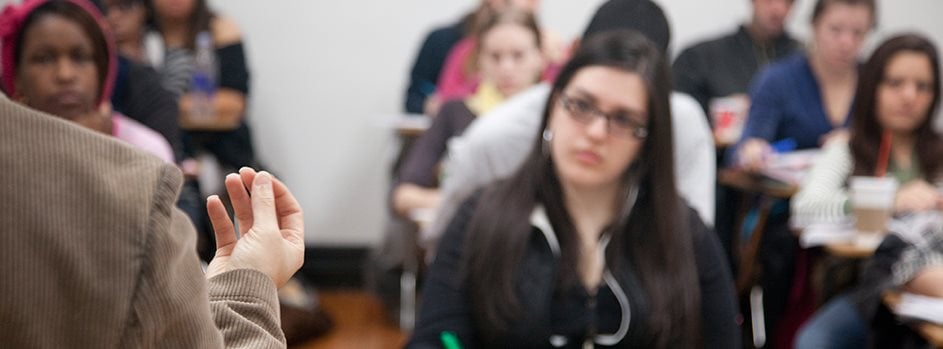
St. Joseph's University, New York is proud of its faculty and the very high level of academic excellence that permeates the entire institution. In addition, St. Joseph’s is deeply committed to a spirit of service to the community.
These two central pillars, scholarship and service, inform and define the culture of St. Joseph's University. In merging the two, St. Joseph's University is pleased to provide a speaker’s bureau to support local academic, educational and cultural institutions or organizations in our common goal.
Listed below is a collection of talks and presentations that faculty members are prepared to give, free of charge. Institutions wishing to avail themselves of this service are invited to contact the individual faculty member, directly, to negotiate the scheduling of a presentation.
Use the form at the bottom of this page to ask any questions and to book a presentation.
Faculty Member's Name: Michael Hanophy, Ph.D.
Faculty Contact Information: [email protected]
Description of Presentation: Microbiology was first established as a field of scientific study in the late 19th century when many of the techniques for the cultivation, identification and observation of microbes were first developed. A new scientific field required education, and Brooklyn’s Hoagland Laboratory at Long Island College Hospital — the first laboratory in the United States erected, equipped, and endowed for the sole purpose of bacteriology — was the first institution in the world ever to offer a course in the study of microbiology.
Intended Audience: General.
Hard/software Needs: A computer with PowerPoint, a projector and a screen.
Faculty Member's Name: Michael Hanophy, Ph.D.
Faculty Contact Information: [email protected]
Description of Presentation: For most of the history of microbiology, bacteria have been grown in laboratories as pure cultures, in test tubes and on petri dishes. Yet we have always known that bacteria really grow in the environment as mixed communities attached to surfaces. Significant research into this type of bacterial growth, known as “biofilm biology,” did not even begin until the 1990s. However, some of the earliest work ever done on biofilms, particularly medically significant ones, was conducted by a young Alexander Fleming, long before his Nobel Prize-winning work on penicillin.
Intended Audience: General.
Hard/software Needs: A computer with PowerPoint, a projector and a screen.
Faculty Member's Name: Michael Hanophy, Ph.D.
Faculty Contact Information: [email protected]
Description of Presentation: The era of the First World War was a time of great scientific advances, including many in the field of microbiology. Among these was Chaim Weizmann’s development of the acetone-butanol-ethanol fermentation, the microbial process developed for large-scale chemical production. In addition to the importance of acetone and butanol production to the Allied war effort, patents of Weitzmann’s techniques indicate that he was the first ever to develop a procedure to modify and improve an industrial bacterial strain.
Intended Audience: General.
Hard/software Needs: A computer with PowerPoint, a projector and a screen.
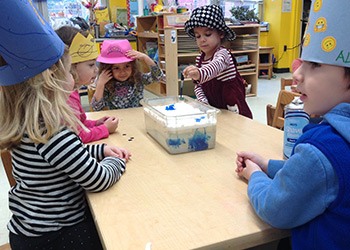 Faculty Member's Name: Karen Russo, Ed.D. and Susan Straut Collard, Ph.D.
Faculty Member's Name: Karen Russo, Ed.D. and Susan Straut Collard, Ph.D.
Faculty Contact Information: [email protected] and [email protected]
Description of Presentation: This multimedia presentation will focus on the interactions of three-, four-, and five-year-olds enrolled in a play-based laboratory pre-school learning environment. The presenters assert that these children are abundantly prepared to read and write, although formalized literacy instruction is not part of the school’s curriculum. During a 20-minute slideshow, this evidence is captured by video and still photographs of play activities that reveal children’s engagement with literacy. In addition, interviews with children, their parents and their teachers will communicate the importance of play and its critical role in literacy development.
Intended Audience: Parents, teachers and early childhood students.
Hard/software Needs: Equipment to display PowerPoint and audio for PowerPoint.
Faculty Member's Name: Joe Ross, Ph.D.
Faculty Contact Information: [email protected]
Description of Presentation: What messages do parents and coaches believe that they are sending to children in the context of youth athletics? What messages do children report that they are receiving…and how closely do these perceptions match? Of greatest import, what is the impact of such messages on the self-concept and overall well-being of the child/athlete? The speaker utilizes interviews with participants, observations of youth leagues and review of past research in offering a discussion/presentation on this important topic.
Intended Audience: Replete with stories and anecdotes, this topic may be presented in a light yet meaningful manner to a “general” audience of families, players and coaches (e.g., a CYO breakfast or a Little League dinner). It has also been adapted and delivered to more targeted audiences of youth-league coaches and league directors, with specific emphasis on the impact of messages — both intended and unintended — on the well-being of the child.
Hard/software Needs: None.
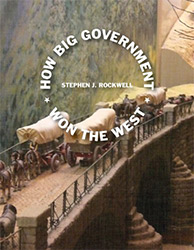 Faculty Member's Name: Steve Rockwell, Ph.D.
Faculty Member's Name: Steve Rockwell, Ph.D.
Faculty Contact Information: [email protected]
Description of Presentation: Dr. Rockwell's research focuses on the important and intrusive activities of the federal government in the nineteenth century. The nineteenth-century United States has long been considered an era of small government and free enterprise, but nineteenth-century America was profoundly influenced by federal public policy. Dr. Rockwell's talk includes discussion of the federal government's roles in westward expansion and U.S. Indian policy, the federal government's early involvement in the development of infrastructure and communications policy, federal regulation of important sectors of the economy and the federal government's relationship to slavery. The presentation challenges us to consider a new interpretation of the federal government's role in America's first century.
Intended Audience: Any.
Hard/software Needs: None.
 Faculty Member's Name: David Seppala-Holtzman, Ph.D.
Faculty Member's Name: David Seppala-Holtzman, Ph.D.
Faculty Contact Information: [email protected]
Description of Presentation: When attempting a free throw in basketball, the player has essentially two components under his or her control: the angle of the shot and the force with which the ball is thrown. We find the shot most forgiving of error.
Intended Audience: General.
Hard/software Needs: A computer with PowerPoint, a projector and a screen.
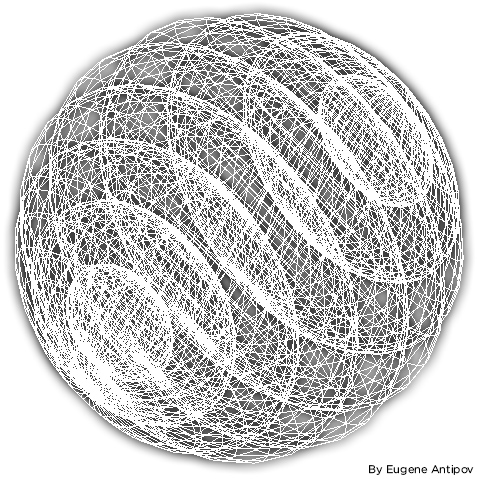 Faculty Member's Name: David Seppala-Holtzman, Ph.D.
Faculty Member's Name: David Seppala-Holtzman, Ph.D.
Faculty Contact Information: [email protected]
Description of Presentation: This presentation makes an elementary case for the universe being a hypersphere, S3. Higher dimensions are introduced along with generalized definitions of spheres and balls. That the universe is a hypersphere then follows directly from the properties of S3 and what we know of the universe.
Intended Audience: This talk can be given to an advanced high school class or to college undergraduates.
Hard/software Needs: A PC with PowerPoint software, a projector and a screen.
 Faculty Member's Name: David Seppala-Holtzman, Ph.D.
Faculty Member's Name: David Seppala-Holtzman, Ph.D.
Faculty Contact Information: [email protected]
Description of Presentation: The "Eye of God" is the name given to the perceived center of the golden spiral that is generated by chopping off smaller and smaller golden rectangles from a given one. It turns out that the coordinates of the Eye of God arise in a most unexpected way.
Intended Audience: This talk can be given to an advanced high school class or to college undergraduates.
Hard/software Needs: A PC with PowerPoint software, a projector and a screen.
 Faculty Member's Name: David Seppala-Holtzman, Ph.D.
Faculty Member's Name: David Seppala-Holtzman, Ph.D.
Faculty Contact Information: [email protected]
Description of Presentation: This presentation seeks to highlight the relationship between mathematics and art by focusing upon the rich area where they intersect.
Intended Audience: Upper-level high school or college undergraduates.
Hard/software Needs: A computer with PowerPoint, a projector and a screen.
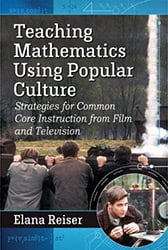 Faculty Member's Name: Elana Reiser, Ed.D.
Faculty Member's Name: Elana Reiser, Ed.D.
Faculty Contact Information: [email protected]
Description of Presentation: In “A Beautiful Mind,” John Nash is a mathematical genius with psychological problems. There are also scores of other movies and media that include math in a less traditional way. You have probably seen this yourself in TV shows such as “The Simpsons,” “The Big Bang Theory,” “Brooklyn Nine-Nine” or “Grey’s Anatomy,” and movies such as “Moneyball” or “The Fault in Our Stars” — perhaps without even realizing it. In this presentation, we explore a curated selection of these popular culture moments with a three-step focus on learning background mathematical information, viewing pertinent media clips and engaging in interactive activities.
Intended Audience: Middle school students and up.
Hard/software Needs: A PC with PowerPoint, a projector and a screen.
Faculty Member's Name: Wendy C. Turgeon, Ph.D.
Faculty Contact Information: [email protected]
Description of Presentation: Children have a natural interest in the big questions of philosophy but we seldom notice this. The educational system focuses on the important basic skills of reading and writing but what is missed when we ignore the curiosity of the questioning child? In this talk I will share how children have a natural philosophical sense of wonder and in what ways educators and parents can encourage young people to become more reflective and aware of the world around them. In engaging in philosophical inquiry with children we discover our own “inner philosopher.” The source for such explorations is nearby: children’s stories and daily life.
Intended Audience: Educators, parents, individuals interested in education.
Hard/software Needs: Projector and screen preferable, but not required.
Faculty Member's Name: Wendy C. Turgeon
Faculty Contact Information: [email protected]
We all care that our children and young people grow up with sound values but how best can we be sure this happens? While there is no guarantee, encouraging ethical inquiry offers children the opportunity to explore their values and become more grounded in what is good and true. What does “ethical inquiry” mean and how does it differ from other value programs that we find in education and in the home? In this talk I will outline what ethical inquiry entails and explore how this approach avoids the dangers of indoctrination and relativism. This talk can be focused on young children or on teens, as requested.
Intended Audience: Educators, parents, individuals interested in ethics and morality.
Hard/software Needs: Projector and screen preferable, but not required.
 Faculty Member's Name: Peter Lin, Ph.D.
Faculty Member's Name: Peter Lin, Ph.D.
Faculty Contact Information: [email protected]
Description of Presentation: A licensed psychologist will provide basic information on diagnosis, etiology, prognosis and treatment of mood disorders.
Intended Audience: Community members.
Hard/software Needs: PowerPoint, laptop and video software.
Faculty Member's Name: Peter Lin, Ph.D.
Faculty Contact Information: [email protected]
 Description of Presentation: In the past several decades, mindfulness training has increasingly been integrated into Western psychotherapy practice. The number of articles that have been published on mindfulness-based intervention has increased enormously in recent years. In general, the mindfulness literature has been written by Western practitioners who have had training in various traditions of Buddhist meditation. The perspective of Asian practitioners who have training in both Western psychotherapy and in Eastern Buddhism continues to be rare. Dr. Lin is a Western trained psychologist and a Chan (Chinese Zen) practitioner who grew up in the Buddhist tradition. This presentation will discuss mindfulness from several different perspectives.
Description of Presentation: In the past several decades, mindfulness training has increasingly been integrated into Western psychotherapy practice. The number of articles that have been published on mindfulness-based intervention has increased enormously in recent years. In general, the mindfulness literature has been written by Western practitioners who have had training in various traditions of Buddhist meditation. The perspective of Asian practitioners who have training in both Western psychotherapy and in Eastern Buddhism continues to be rare. Dr. Lin is a Western trained psychologist and a Chan (Chinese Zen) practitioner who grew up in the Buddhist tradition. This presentation will discuss mindfulness from several different perspectives.
Intended Audience: Community members.
Hard/software Needs: PowerPoint, laptop and video software.
Faculty Member's Name: Thomas Petriano, Ph.D.
Faculty Contact Information: [email protected]
Description of Presentation: This presentation will focus on how the KJB came to be and its ongoing influence on culture, language and history.
Intended Audience: College students and adult groups.
Hard/software Needs: None.
Faculty Member's Name: William A. Trevino, M.A., M.F.A.
Faculty Contact Information: [email protected]
Description of Presentation:
A dramatic interpretation of Edgar Allan Poe’s classic tale of madness and murder (approximately 25 minutes) followed by audience questions and discussion. Prof. Trevino’s theatrical presentations of Poe’s works have been performed at several New York City venues as well as in the master bedroom of Poe’s historical home in Baltimore, M.D. as part of the 2018 International Edgar Allan Poe Festival.
Intended Audience: High school and college students, as well as mature general audiences.
Hard/software Needs: A theatre stage is helpful, but not necessary.
Some of our talks might fit other categories as well. If you would like any recommendations, have a question or want to book a presentation please use the form below.
Get Social
Get Social